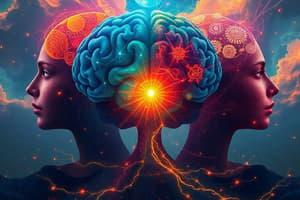Podcast
Questions and Answers
Describe Howard Gardner's theory of Multiple Intelligences and name at least three types of intelligences he proposed.
Describe Howard Gardner's theory of Multiple Intelligences and name at least three types of intelligences he proposed.
Gardner's theory proposes that intelligence is not a single general ability but a combination of multiple independent intelligences. Three examples include verbal-linguistic, logical-mathematical, and spatial-visual intelligence.
Explain the difference between fluid and crystallized intelligence as proposed by Cattell.
Explain the difference between fluid and crystallized intelligence as proposed by Cattell.
Fluid intelligence involves the ability to solve new problems and think abstractly, typically independent of past learning, and tends to decrease with age. Crystallized intelligence is the accumulation of knowledge and skills gained through experience and education, which generally increases with age.
What are the three components of intelligence according to Sternberg's Triarchic Theory?
What are the three components of intelligence according to Sternberg's Triarchic Theory?
The three components are analytical intelligence (problem-solving skills), creative intelligence (ability to deal with novel situations), and practical intelligence (ability to adapt to and manage everyday tasks).
How does Goleman define emotional intelligence, and what are its five main elements?
How does Goleman define emotional intelligence, and what are its five main elements?
What does the term 'savant syndrome' refer to, and what is a common skill observed in savants?
What does the term 'savant syndrome' refer to, and what is a common skill observed in savants?
Discuss the concept of 'savant syndrome' and give an example of a skill that savants may possess.
Discuss the concept of 'savant syndrome' and give an example of a skill that savants may possess.
How does emotional intelligence (EQ) differ from cognitive intelligence (IQ), according to Daniel Goleman?
How does emotional intelligence (EQ) differ from cognitive intelligence (IQ), according to Daniel Goleman?
Describe the significance of the 'Flynn Effect' in intelligence research.
Describe the significance of the 'Flynn Effect' in intelligence research.
What is the purpose of standardized testing in measuring IQ, and how is it applied?
What is the purpose of standardized testing in measuring IQ, and how is it applied?
Explain how Gardner's concept of multiple intelligences can be applied in educational settings.
Explain how Gardner's concept of multiple intelligences can be applied in educational settings.
Describe one environmental factor that has been shown to influence intelligence development.
Describe one environmental factor that has been shown to influence intelligence development.
Explain the primary difference between Thurstone's theory of intelligence and Spearman's theory.
Explain the primary difference between Thurstone's theory of intelligence and Spearman's theory.
Flashcards
Multiple Intelligences
Multiple Intelligences
Intelligence is not a single ability, but a combination of multiple independent intelligences.
Fluid Intelligence
Fluid Intelligence
Ability to solve new problems and think abstractly, less affected by past learning.
Crystallized Intelligence
Crystallized Intelligence
Accumulated knowledge and skills from experience and education.
Triarchic Theory
Triarchic Theory
Signup and view all the flashcards
Emotional Intelligence (EQ)
Emotional Intelligence (EQ)
Signup and view all the flashcards
Savant Syndrome
Savant Syndrome
Signup and view all the flashcards
Flynn Effect
Flynn Effect
Signup and view all the flashcards
Standardized Testing
Standardized Testing
Signup and view all the flashcards
Thurstone's Theory
Thurstone's Theory
Signup and view all the flashcards
Spearman's Theory
Spearman's Theory
Signup and view all the flashcards
Study Notes
Short Answer Questions (20)
-
Howard Gardner's Multiple Intelligences: Intelligence is not a single ability, but a combination of independent intelligences. Examples include verbal-linguistic, logical-mathematical, and spatial-visual.
-
Fluid vs. Crystallized Intelligence: Fluid intelligence involves solving new problems and thinking abstractly (declines with age). Crystallized intelligence is the accumulation of knowledge and skills through experience (increases with age).
-
Sternberg's Triarchic Theory of Intelligence: Intelligence consists of analytical (problem-solving), creative (novel situations), and practical (everyday tasks) skills.
-
Emotional Intelligence (Goleman): The ability to identify, understand, manage, and utilize emotions effectively. Five main elements: self-awareness, self-regulation, motivation, empathy, and social skills.
-
Savant Syndrome: A rare condition where individuals with developmental disorders show extraordinary abilities in specific areas (e.g., exceptional memory, musical talent).
-
Savant Syndrome (continued): This syndrome showcases specialized, extraordinary abilities in individuals with developmental disorders like autism, often in areas like calendar calculation or exceptional memory.
-
Emotional Intelligence (EQ) vs. Cognitive Intelligence (IQ): EQ involves recognizing, understanding, and managing emotions in oneself and others. IQ focuses on intellectual abilities like logic and reasoning.
Short Answer Questions (Continued)
-
Flynn Effect: IQ scores have risen over time across different populations, likely due to environmental factors like improved education and nutrition.
-
Standardized Testing (IQ): Provides a consistent and uniform way to measure intellectual abilities, allowing comparisons across individuals. It uses established norms based on pre-testing representative samples.
-
Gardner's Multiple Intelligences (educational application): Encourages educators to recognize and nurture various intelligences (e.g., musical, interpersonal) by tailoring teaching methods.
-
Environmental Factor influencing intelligence (example): Quality education is an example of an environmental factor that can stimulate cognitive development and provide a supportive environment for intellectual development.
-
Thurstone's vs. Spearman's Theory of Intelligence: Thurstone believed in intelligence as a cluster of independent mental abilities, while Spearman proposed a single "g factor" (general intelligence).
-
Standardizing IQ Tests: Ensures consistent administration and scoring, allowing for easier comparison of scores across individuals and groups.
-
High Spatial Intelligence Skill Examples: Architects, benefitting from spatial reasoning to design buildings.
-
Emotional Intelligence in Leadership: Emotional intelligence for leaders is essential to understand, manage their own emotions, empathize with others, and build effective relationships for a positive work environment.
-
"g Factor" in IQ Testing: “g factor” influences performance on various mental tasks and underlies general cognitive ability as a central concept in IQ testing, with a single score representing the overall intellectual capability.
-
Analytical vs. Creative Intelligence (Sternberg): Analytical intelligence involves problem-solving for familiar situations, while creative intelligence involves tackling new situations and thinking outside the box.
-
Mental Age (Intelligence Testing): Mental age represents the level of intellectual functioning equivalent to a specific chronological age, used to determine IQ by comparison.
-
Savant Syndrome and Challenging Traditional Definitions: Savant syndrome showcases extraordinary abilities in specific areas, challenging assumptions that intelligence is a single correlated measure across skills.
-
Measuring Emotional Intelligence (example): Mayer-Salovey-Caruso Emotional Intelligence Test (MSCEIT) assesses an individual's ability to understand, manage, and use their emotions effectively.
Studying That Suits You
Use AI to generate personalized quizzes and flashcards to suit your learning preferences.
Related Documents
Description
This quiz covers key concepts from various theories of intelligence, including Howard Gardner's Multiple Intelligences, Sternberg's Triarchic Theory, and Emotional Intelligence. Explore the distinctions between fluid and crystallized intelligence and learn about Savant Syndrome. Test your understanding of these important psychological theories.




